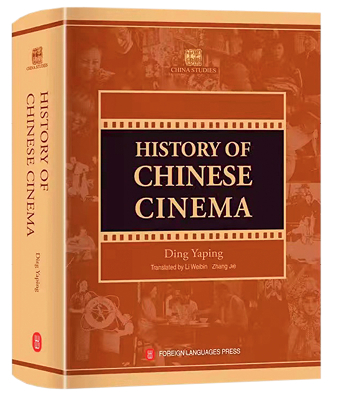
History of Chinese Cinema
Author: Ding Yaping
Hardcover, 788 pages
Published by Foreign Languages Press
The book History of Chinese Cinema provides a broad and deep perspective on the history of Chinese cinema over the past 100-plus years. Taking filmmakers and films as its frame of reference, the book clearly charts out the patterns of the development of Chinese cinema and highlights cinema’s role in China’s mainstream discourse over different historical periods; the gains and losses in the creation of cinematic works, as well as the different definitions of cinema in response to changes in the historical context. Interpreting the development of Chinese cinema and viewing it within a larger historical context, the book presents a comprehensive narrative of the history of Chinese cinema.
The book’s author Ding Yaping, a professor at Communication University of China, is one of the most influential film historians in China. His writings on film history have had a tremendous impact on film historiography in China and abroad.
Ding has divided the history of Chinese cinema into 10 periods correlating with 10 chapters. They are Early Chinese Cinema (1905-1932); Nationality, Revolution, and Popularity: The Rise of Chinese Cinema (1932-1937); From “Orphan Island” to the Rear Areas (1937-1945); Chinese Cinema: From Postwar to Revolution (1945-1949); A New Journey: Torturous Development (1949-1976); Displacement and Narrative (1977-1989); Art and Market (1990-1999); Cinema, Politics, and Individuality (2000-2007); Reproduction and Construction of Chinese Cinema (2007-2010); and Blockbusters and Their Significance (2011-2021).
Cinema, as the author points out in the first chapter, is universally regarded as one of the most important art forms of the 20th century. A year and a half after the birth of the cinema in Paris on December 28, 1895, China embarked on its own cinematic journey. The so-called film screenings that began at the Xu Garden in Shanghai in June 1896 have long been considered a milestone in Chinese cinema.
A golden age of Chinese cinema arrived in the 1930s. Early masterpieces such as The Highway (1934) and Street Angel (1937) not only set their sights toward a more just and equal society, but also questioned how the art of cinema itself might be reimagined along progressive lines by experimenting with innovative visual techniques and unusual narrative structures.
During the War of Resistance Against Japanese Aggression (1931-1945), films had their own particularities: utilitarianism and nationalism. Some well-known films of this period naturally took the war and its aftermath as their subject, from the two-part epic The Spring River Flows East (1947), to the masterpiece Spring in a Small Town (1948) — considered by many critics as the finest Chinese films ever.
After the founding of the People’s Republic of China in 1949, there have been generations of film directors with their representative works, and those marked by aesthetic experimentation, boldly emotive performances, and critical thinking have received critical acclaim and recognition from the audience. Films such as Chen Kaige’s Yellow Earth (1984) and Zhang Yimou’s Red Sorghum (1987) fall within this category. Their mesmerizing use of striking colors and symbolic use of landscapes endowed the films with a breathtaking quality that brought Chinese cinema to the forefront of the international art-house circuit.
Martial-arts films belong to another genre of Chinese cinema that introduced Chinese superstars to the world in the 80s and 90s, such as Jackie Chan, who found global superstardom as the prince of kung fu. At the turn of the century, Chinese martial-arts cinema garnered significant domestic and international attention, owing to Ang Lee’s global success with Crouching Tiger, Hidden Dragon (2000), as well as a series of wuxia (martial arts chivalry) epics such as Zhang Yimou’s Hero (2002) and Feng Xiaogang’s The Banquet (2006).
In the process of the industrialization of cinema after China’s entry into the WTO, the size of the Chinese box office has increased by more than 10-fold. In 2011, China produced 558 domestic feature films, grossing a total of RMB 13.115 billion at the box office. The revolution-themed blockbuster: Beginning of the Great Revival (2011), a film featuring 108 stars, tells the history of the Communist Party of China (CPC) from the Revolution of 1911 to the establishment of the CPC in 1921. With a splendid cast, the film raked in over RMB 300 million.
In recent years, another impressive film, The Wandering Earth, opened a new chapter in hard science fiction-driven narratives in Chinese cinema. In addition to the core values rooted in Chinese culture, meticulously executed and commercially sound production is also the key to its success.
Embodying national realities and sentiments, the zeitgeist, and shared values and traditions, Chinese films promote dialogue and integration between the East and the West and between old and new ideologies. Meanwhile, the tremendous vitality of the film industry unlocked by the market dynamics and the rapid development of digital technology has become a powerful driving force for film narrative and artistic creation. Chinese films have increasingly gained steam worldwide for the artistic charms of Chinese culture.
Although the confluence of film, television, and cross-media content has become a new trend, there is still the consensus that “content is paramount” among film-goers in the internet era with the rise of meta-universe. These have opened up new frontiers for new generations of content creators and storytellers to explore and captivate their audiences in.
By actively connecting the physical world and the virtual world, the rich portrayal of Chinese elements of the times that reflect life’s realities will be better incorporated into Chinese films and content. A more dynamic, influential creativity in the film and television field embodying the distinctive features of the times can be expected in the future.